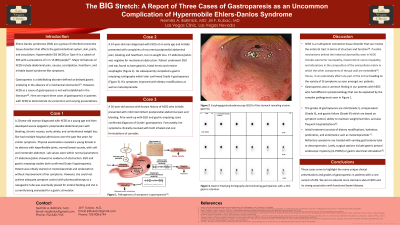Back


Poster Session E - Tuesday Afternoon
Category: Functional Bowel Disease
E0266 - The Big Stretch: A Report of Three Cases of Gastroparesis as an Uncommon Complication of Hypermobile Ehlers-Danlos Syndrome
Tuesday, October 25, 2022
3:00 PM – 5:00 PM ET
Location: Crown Ballroom

Has Audio

Nermila A. Ballmick, MD
Las Vegas Clinic
Las Vegas, NV
Presenting Author(s)
Nermila Ballmick, MD, Jiri Kubac, MD
Las Vegas Clinic, Las Vegas, NV
Introduction: Ehlers-Danlos syndrome (EDS) is a rare autosomal dominant connective tissue disorder that affects the gastrointestinal system, skin, joints, and vasculature. Hypermobile EDS (hEDS) is a subset of EDS with a prevalence of 1 in 5000 people. Major GI features of hEDS include abdominal pain, nausea, constipation, heartburn, and irritable bowel syndrome-like symptoms. Gastroparesis is a debilitating disorder defined as delayed gastric emptying in the absence of a mechanical obstruction. However, hEDS as a cause of gastroparesis is not well established in the literature. Here we report three cases of gastroparesis in patients with hEDS to demonstrate its uncommon and varying presentations.
Case Description/Methods: Our first patient is a 20-year-old woman who was diagnosed with hEDS at a young age and then developed severe epigastric postprandial abdominal pain with bloating, intractable nausea, early satiety, and unintentional weight loss. She had multiple ER admissions over the past few years for similar symptoms. Physical examination revealed hyperflexible joints, normal bowel sounds with nontender abdomen. Lab values were within normal limits. Esophagogastroduodenoscopy (EGD) and gastric emptying studies both confirmed Grade III gastroparesis. She was initially started on Metoclopramide and Ondansetron without improvement. Patient ultimately achieved symptom control with Azithromycin, Ondansetron, Promethazine as needed and diet modifications. The second patient is a 24-year-old man who was also diagnosed with hEDS at an early age and presented with recurrent postprandial abdominal pain with bloating and heartburn, but no weight loss. He underwent EGD and was found to have gastritis, hiatal hernia and reflux esophagitis. Subsequent gastric emptying scintigraphy later confirmed Grade II gastroparesis and his symptoms improved with diet modifications as well as Metoclopramide. Lastly, our third patient is a 26-year-old woman also with known history of hEDS who presented with mild intermittent postprandial abdominal pain and abdominal bloating. Prior work-up with EGD and gastric emptying scans confirmed the diagnosis of Grade I gastroparesis. Fortunately, her symptoms clinically resolved with regular cannabis use.
Discussion: Gastroparesis should be considered in patients with hEDS complaining of severe postprandial abdominal pain. Due to its uncommon presentation and multi-system organ involvement, EDS should be considered in patients with idiopathic gastric dysmotility and joint hypermobility.
Disclosures:
Nermila Ballmick, MD, Jiri Kubac, MD. E0266 - The Big Stretch: A Report of Three Cases of Gastroparesis as an Uncommon Complication of Hypermobile Ehlers-Danlos Syndrome, ACG 2022 Annual Scientific Meeting Abstracts. Charlotte, NC: American College of Gastroenterology.
Las Vegas Clinic, Las Vegas, NV
Introduction: Ehlers-Danlos syndrome (EDS) is a rare autosomal dominant connective tissue disorder that affects the gastrointestinal system, skin, joints, and vasculature. Hypermobile EDS (hEDS) is a subset of EDS with a prevalence of 1 in 5000 people. Major GI features of hEDS include abdominal pain, nausea, constipation, heartburn, and irritable bowel syndrome-like symptoms. Gastroparesis is a debilitating disorder defined as delayed gastric emptying in the absence of a mechanical obstruction. However, hEDS as a cause of gastroparesis is not well established in the literature. Here we report three cases of gastroparesis in patients with hEDS to demonstrate its uncommon and varying presentations.
Case Description/Methods: Our first patient is a 20-year-old woman who was diagnosed with hEDS at a young age and then developed severe epigastric postprandial abdominal pain with bloating, intractable nausea, early satiety, and unintentional weight loss. She had multiple ER admissions over the past few years for similar symptoms. Physical examination revealed hyperflexible joints, normal bowel sounds with nontender abdomen. Lab values were within normal limits. Esophagogastroduodenoscopy (EGD) and gastric emptying studies both confirmed Grade III gastroparesis. She was initially started on Metoclopramide and Ondansetron without improvement. Patient ultimately achieved symptom control with Azithromycin, Ondansetron, Promethazine as needed and diet modifications. The second patient is a 24-year-old man who was also diagnosed with hEDS at an early age and presented with recurrent postprandial abdominal pain with bloating and heartburn, but no weight loss. He underwent EGD and was found to have gastritis, hiatal hernia and reflux esophagitis. Subsequent gastric emptying scintigraphy later confirmed Grade II gastroparesis and his symptoms improved with diet modifications as well as Metoclopramide. Lastly, our third patient is a 26-year-old woman also with known history of hEDS who presented with mild intermittent postprandial abdominal pain and abdominal bloating. Prior work-up with EGD and gastric emptying scans confirmed the diagnosis of Grade I gastroparesis. Fortunately, her symptoms clinically resolved with regular cannabis use.
Discussion: Gastroparesis should be considered in patients with hEDS complaining of severe postprandial abdominal pain. Due to its uncommon presentation and multi-system organ involvement, EDS should be considered in patients with idiopathic gastric dysmotility and joint hypermobility.
Disclosures:
Nermila Ballmick indicated no relevant financial relationships.
Jiri Kubac indicated no relevant financial relationships.
Nermila Ballmick, MD, Jiri Kubac, MD. E0266 - The Big Stretch: A Report of Three Cases of Gastroparesis as an Uncommon Complication of Hypermobile Ehlers-Danlos Syndrome, ACG 2022 Annual Scientific Meeting Abstracts. Charlotte, NC: American College of Gastroenterology.

